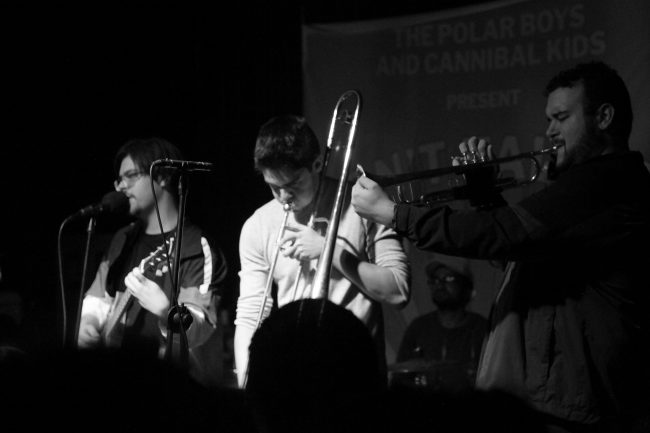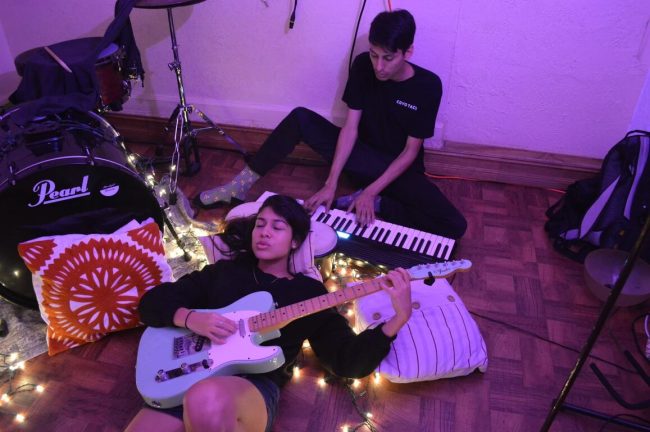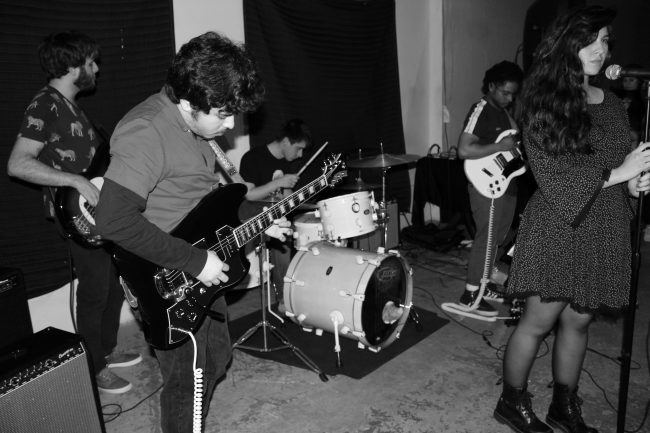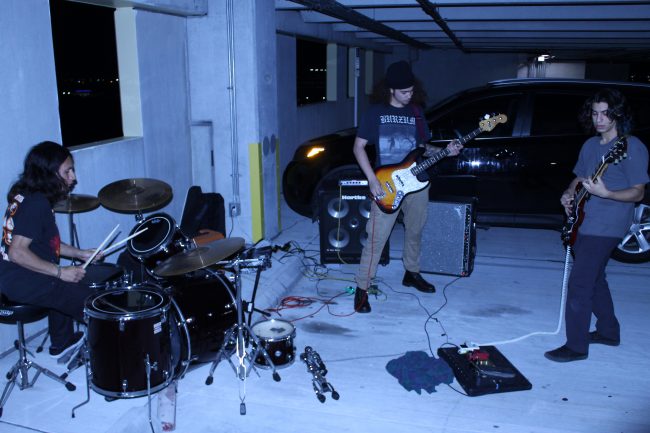Miami’s local music scene may be shut down due to the coronavirus, but that doesn’t mean the tunes have stopped playing. These five groups provide an alternative to the city’s high pressured hustle. Varied and dynamic, they have made Miami a unique, diverse and tight-knit place. We interviewed Mahogany Purple, Ela, Womanhouse, Headfoam, and Moongazer about their past and Miami’s unique local music scene. Caplin News presents: “Five Miami Artists to Keep Your Eye On.”
Mahogany Purple

Even though they had their official debut in January 2018, the members of Mahogany Purple have been playing music with one another all their lives. Over years of practicing and perfecting their individual skills, the band has fused indie and jazz elements to craft a smooth and upbeat sound.
We spoke with Toussaint Lewis (drums), Julien Cabrera (trumpet), Alam Monsivaiz  (trombone), Alvaro Marmolejo (guitar), and Gabriel Garcia (guitar and vocals) after their show at the Hippie Haven, a gallery on NW 71st Street, to talk about the Miami music scene and their journey as a group.
(trombone), Alvaro Marmolejo (guitar), and Gabriel Garcia (guitar and vocals) after their show at the Hippie Haven, a gallery on NW 71st Street, to talk about the Miami music scene and their journey as a group.
Toussaint Lewis says the Miami scene is special due to how “underdeveloped” it is. The band has witnessed this grow and change through its time in the city.
“You can truly see how passionate everyone is through their music,” Toussaint added. “Seeing the scene grow so much since we’ve first started is such a heartwarming feeling, to say the least.”
But the band has had to overcome challenges along the way. Location, in fact, is the biggest one. They have operated from two different states since Julien and Gabriel moved to Boston to study at the Berklee School of Music. But the members of Mahogany Purple don’t allow this to hinder their work, relying on scheduled “meetings” over FaceTime and tasking each other to listen to new music for inspiration.
Since the majority of Mahogany Purple’s gigs are in Miami (or at least were until the shutdown), raising money for travel expenses has become a group effort. For a recent show at Hippie Haven, the band pooled funds to fly Julien and Gabriel down from Boston. Despite all this, the band seems to be going strong.
“No matter what, music is our passion and we simply love to push the idea of no creative limitations,” said Toussaint.
“We want to show people it’s alright to be yourself and to embrace individuality, because that’s what life is all about!”
Click here to listen to Mahogany Purple’s latest EP, “Late to the Party.”
Ela

Angela Monzon, known in the Kendall scene as Ela, is an R&B/Jazz singer from Miami. Her two singles– “Wanna Love You” and “I Don’t Know Why” — are different in their moods, but both feature her jazzy vocal range over a groovy drum and synthline. “I Don’t Know Why” showcases jazz elements including horn. From a young age, Ela has been fascinated by the sheer joy of music.
She was encouraged by her sister, Isis, to develop instrumental skills. After Isis enrolled in band class during high school, Ela picked up some skills. She began practicing the trumpet while learning proper music theory. After entering college and seven years of being trained on the trumpet, Ela began playing guitar and singing, which inspired her to try new forms of music. Though her main focus has been on covering other artists, Ela has written two original songs, Wanna Love You and I Don’t Know Why, establishing a name for herself in the Miami music scene.
Drawing inspiration from the likes of Tyler, the Creator and Amy Winehouse, Ela showcases a wide-ranging musical palette.
Ela said, “What I really enjoy about Tyler is the fact that he makes music the way he wants, no pressure from anyone but his desires, and I respect that so much! It’s motivational for me.”
She also explained that Winehouse awakened her interest in jazz, which is present in her music. Additionally, since summer 2018, Ela has been playing with keyboardist Miguel Meneses as a duo. Miguel has also become involved in writing and producing music for current and upcoming projects.
Ela described her creative process as “messy.”
“I have everything in my head but it’s difficult to translate that onto paper, or even a song, considering there may be a new or better set of ideas,” she said.
This causes one of her bigger challenges: “finishing a concept.” She tends to revisit ideas, consistently tweaking the music as better paths reveal themselves. One may say she’s a perfectionist, but what artist isn’t?
“Despite the mental weight music can have and the number of times I may redo my concepts or just ideas, it’s worth it in the end, because at the end of the day, all that matters for me is for people out there to feel my music. I want my music to provoke emotion, whether it’s happiness, or something people can relate to on a deeper level, that’s the message behind my music.”
Womanhouse

We caught up with Womanhouse on a Wednesday night before the shutdown at Space Mountain, an art space in Little Haiti. It was only their second show following the release of their first EP, titled Womanhouse. The indie-alternative group played an electric set, showcasing dreamy vocals and melodic instrumental harmonies which wrap the listener in a captive trance. We interviewed Emily Afre (vocals), Andrés Nuñez (guitar), Carlo Barbacci (bass), Björn Roland (drums), and Steve Montoya (guitar) in the parking lot after a dedicated process of breaking down their equipment to make way for the next band.
After a few minutes, it became clear that Womanhouse was a band only waiting to cross paths. Björn claims he walked into SpecialTea, a cafe on Coral Way near FIU, one day to find Emily writing lyrics. He immediately asked whether she was interested in making music.
Björn knew Steve from high school, when they used to cover music in his garage. Andrés was involved in another project, but asked to jam with them one day. That first time playing all together, they wrote the song Bay Bridge, and Andrés joined them full time. Steve and Emily met Carlo after seeing him play a show one night at 1306, a Miami bar, and after a contentious search for a bassist (They auditioned ”At least six people,” Björn claims), he finally joined the band this past June. They are candid in admitting they come at the music from different directions, as showcased by their wide ranging inspirations as a band.
“The band inspiration is the fusion of our inspirations, all together,” Carlo stated. “(We are) five different palettes,” Steve added. “And trying to make it work.” Andrés finished.
When asked about what making music in Miami scene is like, the group agrees it’s “smaller”. Andrés says that almost every other city already has a distinct sound arising from it– but Miami is unique.
“The bands here are really different,” Carlo begins. “They’re all going their own way.”
In regards to their biggest success as a group, Emily recounts that finishing the EP was a major milestone.
“When you’re making music and you hear it live, it’s a very transient thing, right? But then, once you’re finally able to release it digitally, it’s almost as if you’re actualizing that transience. It becomes materialized, even though it’s just digital, because then you can access it whenever and anybody can listen to it.”
The band agrees that the internet age is “the best time to make music.”
Find Womanhouse and their new EP, Womanhouse, on all streaming platforms.
Headfoam

Headfoam was doing a weekly rehearsal set before the shutdown in an FIU parking garage when we met up with them. They’re pretty notorious for getting loud because you can hear them across campus, shredding amongst themselves and whoever else stumbles upon them. Their music incorporates punk elements, like an unrelenting guitar combo and energetic drumline, but the vocals tend to be of more the trasher nature– exemplified by their identification as punk/trasher group. Luis “Eskrott” Collazos (drums and vocals), Alex “Thrash” Noel (guitar and vocals), and Rafael “Red” Rivera (bass) make up the Miami thrasher trio; we interviewed them during a break from their instruments.
Headfoam began at Northtrail Skate Park, but Red and Luis have known each other since high school. Like Womanhouse, the band agrees that the Miami music scene is comparably small, but they say it’s special because it provides an intimate community for local bands to support each other, especially through organizing group shows and showing up to see each other play. As a band, their biggest challenge, as well as success, has been finding a common time and space to practice– they all live in different areas, from Miramar to Sweetwater to Cutler Ridge, and have struggled to find a place to rehearse. But FIU parking garages, as well as their friend Laura, have provided the band safe havens to practice and get as loud as they want.
Watching them interact, sharing different anecdotes and laughs throughout the interview, you can tell that they’re close friends first and band-members second. As artists, they give their all to their craft, leaving your head buzzing with a fierce intensity after a song finishes. And naturally, they love to talk music, rattling off their inspirations, favorite and least favorite concerts.
When asked what performing is like, Luis said, “anxiety… but when I’m up there, I’m good.”
Everyone has good shows and bad shows– and Headfoam seems to be in the process of accepting all perfomances as crucial to their development– even when they mess up. “Sometimes we like that we fuck up because it brings a humanity to [the performance],” Alex said.

Moongazer
We met Moongazer at Unbranded Brewing Co., where they were playing for a second night to celebrate the new brewery’s opening not too long ago. The psychedelic rock group from Miami has a pretty significant following, due to their recognizable sound and long-standing presence in the Miami music scene. The band consolidates elements of psychadelia, such as the synthesizer, with enigmatic vocals and protracted instrumental sets, as well as progressive rock to create a recognizable sound.
The band commonly performs tracks longer than ten minutes, in typical prog-rock fashion. The same track may never be the same twice because it seems like the band uses music as a guide rather than a final product to be performed as-is. Karl Martinez (bass), Philip Bourgi (keyboard/synthesizer), Jordan Underbrink (guitar/vocals), Allan Saul Nigri (guitar), and Cesar Alfaro (drums) caught up with us after a zealous two hour set to talk successes, challenges, and what it’s like to work together.
Moongazer seems to be the product of a lifetime. Jordan and Philip met when they were eight years old and began making music in high school. The group seemed to have difficulty agreeing on exactly how Moongazer began, due to the project having previously existed under different names– such as Steel Joe and Steamed Fuzz– and with different members. Moongazer’s first album, Swimming in Mirrors, was recorded before Karl and Allan had entered the band.
As they are currently in the process of recording their second album, they speak of this particular phase of Moongazer as a sort of new beginning. When asked about whether they see their members changing again, Philip jokes: “Karl is the one on the loose.” “I definitely felt like it was meant to be,” Jordan chimes in, joining the interview over phone call. “Members came and went, and came back again– it’s definitely meant to be.”
One thing that seems to be fundamental in the band is how different all the members are from each other, which they seem to embrace– for better and for worse. When it comes to writing music together, they take a “composer based” approach, where one member comes forward with the foundation to a track and the others build upon that.
“So here’s the thing: our songs are long as fuck,” Cesar said. “But we don’t mean to make it that way. It’s lowkey an accident because we don’t know how to end music.”
Their differences as people are simultaneously their strength and weakness. They cite punctuality as a major challenge, which raises debate from the group.
“We all clash. No matter how much we would wish for some people to be more punctual, that’s just who they are,” Cesar said.
Philip interjected: “It’s not even about just being more punctual! It’s about being more something in someone else’s eyes. Just accept everyone, and love everyone, and fuck this.”
Moongazer cites their local fanbase as one of their successes. Not only do they appreciate people coming out to support them, but also the sense of community that has arisen when people want to get involved with Moongazer through their own artforms. And above all– they love performing. Non-verbal communication is essential to their music, which requires a particular level of understanding amongst each other. Despite their challenges, Moongazer seems to be thriving in the Miami music scene. Finally, the band wanted to shout-out Moksha Arts Collective, who has been providing them support and rehearsal space. “It’s part of that cosmic, meant to be shit Jordan was talking about,” Phillip finished.
Find Moongazer’s first album, Swimming in Mirrors, on Spotify.
Editor’s Note: COVID-19 has greatly affected musicians and the local venues which offer them a space to play. If you have the financial means to do so, please be a good patron and support your favorite local artists through purchasing their music, and finding other ways to financially contribute to them. Music keeps us all a little closer. We need it now more than ever!
(Editor’s note: This story is part of a series describing the transformational effect of coronavirus on the young. For more stories, click here.)

































